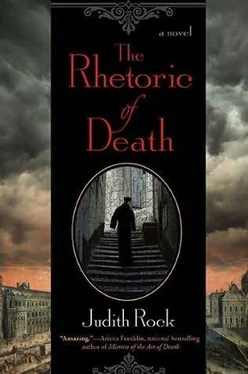Judith Rock - The Rhetoric of Death
Здесь есть возможность читать онлайн «Judith Rock - The Rhetoric of Death» весь текст электронной книги совершенно бесплатно (целиком полную версию без сокращений). В некоторых случаях можно слушать аудио, скачать через торрент в формате fb2 и присутствует краткое содержание. Жанр: Исторический детектив, на английском языке. Описание произведения, (предисловие) а так же отзывы посетителей доступны на портале библиотеки ЛибКат.
- Название:The Rhetoric of Death
- Автор:
- Жанр:
- Год:неизвестен
- ISBN:нет данных
- Рейтинг книги:3 / 5. Голосов: 1
-
Избранное:Добавить в избранное
- Отзывы:
-
Ваша оценка:
- 60
- 1
- 2
- 3
- 4
- 5
The Rhetoric of Death: краткое содержание, описание и аннотация
Предлагаем к чтению аннотацию, описание, краткое содержание или предисловие (зависит от того, что написал сам автор книги «The Rhetoric of Death»). Если вы не нашли необходимую информацию о книге — напишите в комментариях, мы постараемся отыскать её.
The Rhetoric of Death — читать онлайн бесплатно полную книгу (весь текст) целиком
Ниже представлен текст книги, разбитый по страницам. Система сохранения места последней прочитанной страницы, позволяет с удобством читать онлайн бесплатно книгу «The Rhetoric of Death», без необходимости каждый раз заново искать на чём Вы остановились. Поставьте закладку, и сможете в любой момент перейти на страницу, на которой закончили чтение.
Интервал:
Закладка:
“You are not listening, mon cher Maitre Beauchamps,” Jouvancy snapped. “Even if my nephew comes back-and pray God he does-he will forfeit his place in the ballet. You must find another Hercules.”
“Another Hercules?” Beauchamps’s widening smile showed little yellow teeth that reminded Charles of a fox’s. “Oh, but of course!” The dancing master gestured at the room, which was filling with boys. “He grows on trees, Hercules. I have only to reach out and pluck him.” He thrust his face even closer to Jouvancy’s. “There is no other Hercules ripening in your little orchard, mon pere.”
“No. There is not. But you were already threatening to replace my poor Philippe because of his behavior. You have a half dozen Opera dancers who could do Hercules in their sleep, even at this late date. Be so good as to choose one and bring him tomorrow.”
Jouvancy swept away to his actors. Beauchamps ground his teeth, his shoe ribbon bouncing as he tapped one of his beautifully made shoes. With a sinking heart, Charles realized that in the distraction of Philippe’s flight yesterday, he had failed to address the question of the chiming clock headdress. Fortunately, Jouvancy hadn’t yet asked him about it. But now was definitely not the moment to confront the dancing master.
Jouvancy led everyone in a short and uncharacteristically militant prayer and dismissed them to mark out their practice stages. Armand Beauclaire and Jacques Doute tried to ask him about Philippe, but he waved them away without answering and Charles set them to moving benches. After a brief, tense conference, Beauchamps and Charles started the cast on the Hesperides section of the ballet, beginning with the ensemble gigue for Hercules’s suite.
The music began to ripple from Beauchamps’s fiddle and Charles settled on a bench with a ballet livret in his lap, ready to prompt anyone who forgot his entrance and exit cues. The dancing master sawed away, stamping the rhythm on the floor when the dancers lost the beat, and yelling corrections. What Beauchamps was able to pull from the students amazed Charles. As he watched, he thought how lucky he was to live in an age when dancing had reached the very height of perfection. At once lively and dignified, it really was the true expression of the soul, as the best classical principles inherited from the ancient writers directed it should be. Arms, hands, and fingers were held softly curved, arms were never raised above the shoulder, legs never higher than a forty-five degree angle from the hip. Feet in their heeled and ribboned shoes flashed like knives in small, precise steps and jumps. Dancers pirouetted as smoothly as cream pouring from a pitcher, balanced as solidly as statues. When all went well, not the slightest sign of effort showed. Charles sighed with satisfaction.
Then he frowned and looked down at his own feet. They were twitching, sketching the gigue’s steps as the dancers did them, and he realized that his body was remembering what his mind had long forgotten. Dances and their music were often passed among colleges and reused for different characters in different ballets. Between them, he and the Carpentras ballet master had taught this gigue to a suite of comets a year or so ago, in a ballet about the classical myths behind the names of the constellations. The six dancers in the suite all had the same steps, though their floor patterns differed. Charles had taught the part that Armand Beauclaire, yesterday’s logician with the thatched head, now had. He winced as Beauclaire, an accomplished technician-with, apparently, no ear for music-strayed further and further from the melody.
Beauchamps stopped playing in the middle of a measure and flung his violin to his hovering servant. Grabbing a handful of papers from a bench, the dancing master bore down on Beauclaire. The other dancers exchanged resigned looks and studied their shoes.
“Your steps are perfect, as usual, Monsieur Beauclaire. But that is all that is perfect and it is not enough, as I have told you more times than I have gray hairs! Your steps are on the wrong notes. Why? You do not know the music. And you do not know the shape of the dance on the page, so you do not know your path on the floor. Though how you cannot know all that by now, the goddess of dance Terpsichore, she only knows.” He cast his eyes up toward a classical heaven and thrust his handful of pages at the boy. “First, the music. Sing it.”
Panic crossed Beauclaire’s round face. “Sing?” he faltered, staring at the pages.
Each page had a line of music printed at the top, and below that, a maze of vertical lines crosshatched with what looked like the tracks of a crazed chicken. Jouvancy had told Charles that Beauchamps’s pet project was a way of writing dance, which he was teaching the students to read. That, Charles guessed, was what Beauclaire was staring at so hopelessly.
“But, maitre, I…”
“You sing like a donkey, yes, we know that. There, at the top, that line is the music that goes with this page of steps. As you should know by now,” he sighed.
Sweat broke out on the boy’s face, but he drew himself up manfully. “Would you give me the first note, please, maitre?”
Beauchamps sang a pure and liquid note, and Beauclaire plunged into the gigue’s tune like a prisoner jumping from a gangplank. Charles looked away and bit his lip. The boy really did sound like a donkey.
“No, no, no!” Beauchamps grabbed the papers away and gave them to the small blond who had suggested yesterday that Philippe might have been taken ill. The boy calmly started the melody with perfect pitch and in perfect time, his surprising treble clear as birdsong.
“There, Monsieur Beauclaire, you see? Compound duple meter. Six beats to the measure, distributed over the underlying beat of two.” He beat the six on his thigh while counting the two. “You see? Come, the rest of you, join in. Not you!” Beauchamps pulled the escaping Beauclaire back from the group. “You will listen as you follow the music and read your steps on the page.”
Charles listened in amazement as the boys sang the lilting melody line. Everyone who learned to dance learned to read music, of course, but these boys were musicians as well as dancers. What would happen on the courtyard stage on the seventh of August would indeed have more in common with court and professional performances than with the earnest little shows he had helped to produce at Carpentras.
“Now, Monsieur Beauclaire,” Beauchamps said, with terrifying gentleness, when the singers finished. “Now let us see you put it all together.”
The dancers took their places. Beauchamps closed his eyes briefly in what looked like prayer and began to play. All was perfection and Charles released his held breath, still marking the steps with his feet and singing quietly along with the melody. Then all six boys went down in a writhing tangle.
“Ow! Get off, you ass!” Indignant howls rose from the heap as Beauclaire struggled to his feet. “You go left, idiot,” someone cried at him despairingly, “left!”
Beauchamps barreled onto the stage and grabbed Beauclaire’s hand. “This is your right hand.” He dropped it and grabbed the other hand. “This one is your left. Do I have to tie colored ribbons on them so you can remember?” He marched Beauclaire, who had clearly given up all hope, through the floor pattern again and picked up his fiddle. “Now. With perfect timing. With perfect directions. Or I may kill you.”
The dejected Beauclaire looked as though that might be preferable, but he and his fellows dutifully began again. Beauchamps played and sang the tune, leaning precariously in whatever direction Beauclaire was supposed to turn. As the boys turned accurately and on the correct notes, Charles relaxed again, his feet still marking the remembered steps. Then Beauclaire did a series of small beautiful leaps in the wrong direction, two other boys skidded out of his way, and Beauclaire cannoned into Jacques Doute, who was standing offstage. The dancing master sank onto the bench beside Charles, laid down his violin as though it were his dead beloved, and put his head in his hands. A deathly quiet descended on the ballet end of the room.
Читать дальшеИнтервал:
Закладка:
Похожие книги на «The Rhetoric of Death»
Представляем Вашему вниманию похожие книги на «The Rhetoric of Death» списком для выбора. Мы отобрали схожую по названию и смыслу литературу в надежде предоставить читателям больше вариантов отыскать новые, интересные, ещё непрочитанные произведения.
Обсуждение, отзывы о книге «The Rhetoric of Death» и просто собственные мнения читателей. Оставьте ваши комментарии, напишите, что Вы думаете о произведении, его смысле или главных героях. Укажите что конкретно понравилось, а что нет, и почему Вы так считаете.












